
The 1992 United States presidential election was the 52nd quadrennial presidential election, held on Tuesday, November 3, 1992. Democratic Governor Bill Clinton of Arkansas defeated incumbent Republican President George H. W. Bush and independent businessman Ross Perot of Texas. The election marked the end of a period of Republican dominance in American presidential politics that began in 1968,, and also marked the end of 12 years of Republican rule of the White House, as well as the end of the Greatest Generation's 32-year American rule and the beginning of the baby boomers' 28-year dominance until 2020. It was the last time the incumbent president failed to win a second term until 2020, when Donald Trump lost the election to Joe Biden; it was the first such occurrence since 1980.

Louis Farrakhan is an American black supremacist and religious leader who heads the Nation of Islam (NOI). Prior to joining the NOI, he was a calypso singer who used the stage name Calypso Gene. Earlier in his career, he served as the minister of mosques in Boston and Harlem and was appointed National Representative of the Nation of Islam by then NOI leader Elijah Muhammad. He adopted the name Louis X, before being named Louis Farrakhan.

The 2008 United States presidential election was the 56th quadrennial presidential election, held on November 4, 2008. The Democratic ticket of Barack Obama, the junior senator from Illinois, and Joe Biden, the senior senator from Delaware, defeated the Republican ticket of John McCain, the senior senator from Arizona, and Sarah Palin, the governor of Alaska. Obama became the first African American to be elected to the presidency, as well as being only the third sitting United States senator elected president, joining Warren G. Harding and John F. Kennedy. Meanwhile, this was only the second successful all-senator ticket since the 1960 election and is the only election where both major party nominees were sitting senators. This was the first election since 1952 in which neither the incumbent president nor vice president was on the ballot.

Maxine Moore Waters is an American politician serving as the U.S. representative for California's 43rd congressional district since 1991. The district, numbered as the 29th district from 1991 to 1993 and as the 35th district from 1993 to 2013, includes much of southern Los Angeles, as well as portions of Gardena, Inglewood and Torrance.
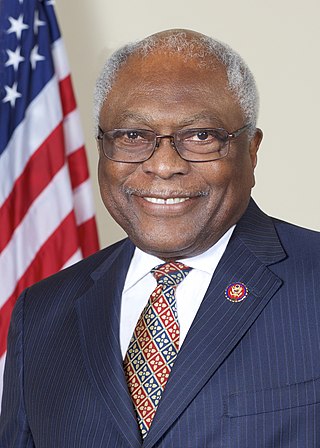
James Enos Clyburn is an American politician and retired educator serving as a Democratic member of the U.S. House of Representatives from South Carolina. He has also served as House assistant Democratic leader since 2023, having previously held the position from 2011 to 2019. Clyburn additionally served as House Majority Whip between 2007 and 2011 and between 2019 and 2023.

The 1992 presidential campaign of Bill Clinton, then the governor of Arkansas, was announced on October 3, 1991, at the Old State House in Little Rock, Arkansas. After winning a majority of delegates in the Democratic primaries of 1992, the campaign announced that then-junior U.S. senator from Tennessee, Al Gore, would be Clinton's running mate. The Clinton–Gore ticket went on to defeat Republican incumbent President George H. W. Bush and Vice President Dan Quayle in the presidential election on November 3, 1992, and took office as the 42nd president and 45th vice president, respectively, on January 20, 1993.
New Democrats, also known as centrist Democrats, Clinton Democrats, or moderate Democrats, are a centrist ideological faction within the Democratic Party in the United States. As the Third Way faction of the party, they are seen as culturally liberal on social issues while being moderate or fiscally conservative on economic issues. New Democrats dominated the party from the late 1980s through the mid-2010s, and continue to be a large coalition in the modern Democratic Party.
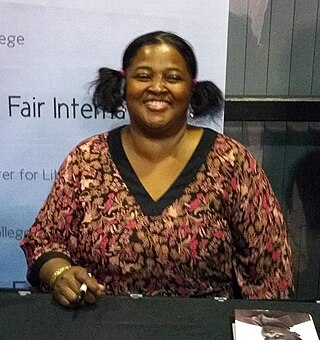
Sister Souljah is an American author, activist, rapper and film producer. Democratic Party candidate Bill Clinton criticized her remarks about race in the United States during the 1992 presidential campaign. His repudiation of her comments led to what is now known in American politics as a Sister Souljah moment.

David Plouffe is an American political and business strategist best known as the campaign manager for Barack Obama's successful 2008 presidential campaign. A long-time Democratic Party campaign consultant, he was a partner at the party-aligned campaign consulting firm AKPD Message and Media, which he joined in 2000.

In the United States 2008 Democratic Party presidential primaries, the total number of delegates was 4050. Delegates required for nomination were 2118.

From January 3 to June 3, 2008, voters of the Democratic Party chose their nominee for president in the 2008 United States presidential election. Senator Barack Obama of Illinois was selected as the nominee, becoming the first African American to secure the presidential nomination of any major political party in the United States. However, due to a close race between Obama and Senator Hillary Clinton of New York, the contest remained competitive for longer than expected; neither candidate received enough pledged delegates from state primaries and caucuses to achieve a majority, without endorsements from unpledged delegates (superdelegates).
The following is a timeline of major events leading up to and immediately following the United States presidential election of 2008. The election was the 56th quadrennial United States presidential election. It was held on November 4, 2008, but its significant events and background date back to about 2002. The Democratic Party nominee, Senator Barack Obama of Illinois, defeated the Republican Party's nominee, Senator John McCain of Arizona.
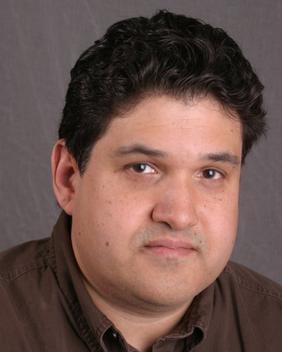
David Eugene Mills was an American journalist, writer and producer of television programs. He was an executive producer and writer of the HBO miniseries The Corner, for which he won two Emmy Awards, and the creator, executive producer, and writer of the NBC miniseries Kingpin.
"A More Perfect Union" is the title of a speech delivered by then-Senator Barack Obama on March 18, 2008, in the course of the contest for the 2008 Democratic Party presidential nomination. Speaking before an audience at the National Constitution Center in Philadelphia, Pennsylvania, Obama was responding to a spike in the attention paid to controversial remarks made by Jeremiah Wright, his former pastor and, until shortly before the speech, a participant in his campaign. Obama framed his response in terms of the broader issue of race in the United States. The speech's title was taken from the Preamble to the United States Constitution.
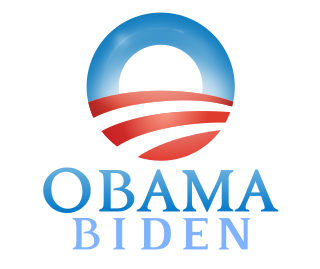
Barack Obama, then junior United States senator from Illinois, announced his candidacy for President of the United States on February 10, 2007, in Springfield, Illinois. After winning a majority of delegates in the Democratic primaries of 2008, on August 23, leading up to the convention, the campaign announced that Senator Joe Biden of Delaware would be the vice presidential nominee. At the 2008 Democratic National Convention on August 27, Barack Obama was formally selected as the Democratic Party nominee for President of the United States in 2008. He was the first African American in history to be nominated on a major party ticket.
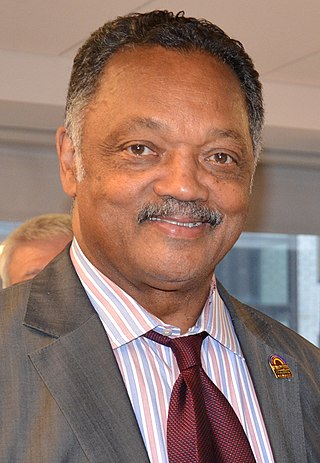
Jesse Louis Jackson is an American political activist, Baptist minister, and politician. He is the father of former U.S. Representative Jesse Jackson Jr. and current Representative Jonathan Jackson.

African-American candidates for president of the United States from major parties include U.S. Senator Barack Obama (D-IL), elected president of the United States in 2008. He was the first African American to win a presidential election and the first African American to serve as president of the United States. He was re-elected as president in 2012. There had been several candidates in the years before.

On April 4, 2011, Barack Obama, the 44th president of the United States, announced his candidacy for re-election as president. On September 5, 2012, he again became the nominee of the Democratic Party for the 2012 presidential election. Along with his running mate, Vice President Joe Biden, Obama was opposed in the general election by former Massachusetts Governor Mitt Romney, along with various minor candidates from other parties. The election took place on Tuesday, November 6, 2012.

The second inauguration of Barack Obama as president of the United States was the 57th inauguration, marking the commencement of his second and final term, with Joe Biden as vice president. A private swearing-in ceremony took place on Sunday, January 20, 2013, in the Blue Room of the White House, followed by a public inauguration ceremony on Monday, January 21, 2013, at the West Front of the United States Capitol in Washington, D.C.
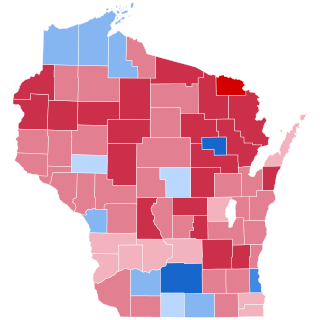
The 2016 United States presidential election in Wisconsin was held on November 8, 2016, as part of the 2016 United States presidential election. Wisconsin voters chose 10 electors to represent them in the Electoral College via a popular vote pitting Republican Party nominee Donald Trump against Democratic Party nominee Hillary Clinton.
















